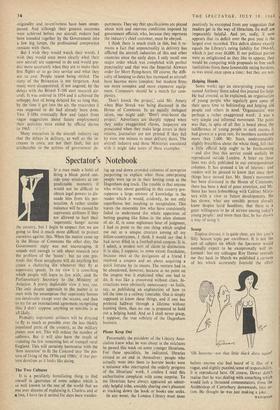The Two Cultures
It is a peculiarly humiliating thing to find oneself in ignorance of some subject which is so well known to the rest of the world that no one ever dreams of explaining it. Clueless and at a loss, I have (as it seems) for days been wander-
ing up and down crowded columns of newsprint purporting to explain what those enterprising people were up to in their betting coup at the Dagenham dog track. The trouble is that anyone who writes about gambling in this country pre- supposes a large amount of knowledge in the reader which it would, evidently, be not only superfluous but insulting to recapitulate. This leaves the miserable few who have consistently failed to understand the whole apparatus of betting gasping like fishes in the alien element of air. lf, in some nightmare hour of judgment, I had to point to the one thing which singled me out as a unique creature among all my fellow-countrymen, I think I would say that I had never filled in a football-pool coupon. It is, I admit, a modest sort of claim to distinction. It is also, I suppose, to some extent fraudulent, because once at the instigation of a friend I received a coupon and set about acquiring a quick fortune by its means. The venture had to be abandoned, however, because at no point on the coupon was it explained what one had to do. It was like a crossword without clues. In- structions were obviously unnecessary—as futile, say, as publishing an explanation of how to tell the time in a railway timetable. One is simply supposed to know these things, and if one has pottered halfway through a lifetime without learning them, then no one is prepared to hold out a helping hand. And so I shall never. grasp, I suppose, the true subtlety of the Dagenham business.










































 Previous page
Previous page